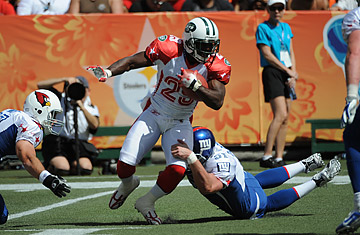
Leon Washington of the New York Jets carries the ball during the NFL Pro Bowl in Aloha Stadium on Feb. 8, 2009, in Honolulu, Hawaii
It's hard to argue in favor of an all-star game in which the league's seventh best player at his position makes the cut, let alone make the case for watching it. This weekend, football fans will be programming their DVRs — most likely to record some other channel — when David Garrard, quarterback for the 7-9 Jacksonville Jaguars, plods onto the field. Contain your excitement if you can: it's time for the Pro Bowl, the NFL's woeful attempt to match the popularity of baseball and basketball's all-star games.
Now don't blame David Garrard. (Although those of us who chose him for our fantasy teams surely will.) Four of the league's élite quarterbacks — Peyton Manning, Ben Roethlisberger, Carson Palmer and Tom Brady — dropped out, citing injury or, in Manning's case, participation in the Super Bowl on Feb. 7. The result? Garrard's QB sneak, a move that lands him a spot as the AFC's third alternate despite pedestrian numbers and a losing record.
An all-star game is only as good as the players who play in it, and that is part of why the Pro Bowl is football's forgotten game: players like Garrard end up taking the field year after year. Legendary Minnesota QB Brett Favre? Selected but not playing, blaming an injury. Gecko-gloved Arizona wide receiver Larry Fitzgerald? Thanks but no thanks: injured also. While the Pro Bowl managed to sell out Dolphins Stadium, the game usually pulls down mediocre TV ratings; it's the only major all-star game that draws lower ratings than regular-season matchups. What gives?
It didn't always used to be this way. Held annually since 1950 (though there were NFL All-Star Games played from 1939 to '42) and typically played the week after the Super Bowl, the Pro Bowl used to be a thing of pride among players (not to mention cause for a sizable bonus back when they still needed the money). But now, in an era of overinflated salaries, players treat the game as a chore rather than an honor. The game was held at the Los Angeles Memorial Coliseum from 1950 to '72. It was then held at various stadiums before moving to Hawaii's Aloha Stadium in 1980, which gave the whole event a sunnier, more laid-back feel. So did the Pro Bowl rules: unlike in an actual game, defenses are limited to a certain number of vanilla formations, much less any coach's full playbook, and the quarterback is allowed to throw the ball away to avoid getting hit without fear of an intentional-grounding penalty. The result is something approaching a scrimmage rather than an actual competition.
To try and muster up some enthusiasm, the NFL made some changes for the 2010 bowl. The game was moved from Hawaii to Miami, site of this year's Super Bowl, and rescheduled for the Sunday before the championship to capitalize on the hype. But as game day approaches, the changes increasingly look like mistakes. Players lost the perk of a trip to Honolulu after a long winter in places like Green Bay and Buffalo and dropped out in droves. And because the New Orleans Saints and the Indianapolis Colts are in the midst of prepping for the Super Bowl, their all-star-caliber players — 14 of them — won't be attending. (In order to collect their Pro Bowl bonuses in their contracts, these players are still required by the NFL to show up at the game; Manning and the Colts plan to fly down for the kickoff, stand around on the sideline and leave at halftime.) All told, a record 29 players are skipping Sunday's game.
So what, if anything, can be done to give the Pro Bowl some luster? A 16-game season in a sport as hard-hitting as the NFL is already a test of endurance; there will always be players who opt out of the Pro Bowl because they're legitimately too beat up to play. Fining players who invent dubious injuries to duck out would be a start, although making a consequential dent in a superstar athlete's salary might be tough. At minimum, moving the game back to the Sunday following the Super Bowl seems like a no-brainer. Teams get to championships in part by having some of the game's best players, and those players should be able to participate without worrying about injuring themselves before the Big Dance. Adjusting the rules to resemble a regular game would improve audience interest immensely. And finally, how about raising the stakes? In Major League Baseball, the All-Star Game winner gets home-field advantage for the World Series; offering some kind of reward for the winning conference would help spur actual competition. For now, the Pro Bowl is a game that satisfies neither fans nor players. Expect the ratings to reflect that yet again on Sunday.
